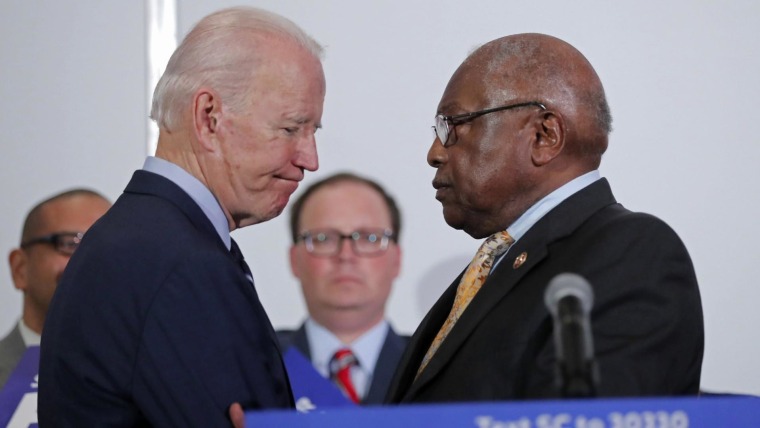WASHINGTON — John Adams, America's first vice president, famously called the job "the most insignificant office that ever the invention of man contrived." And history shows vice presidential candidates rarely have the impact to match the hype surrounding their selection.
But California Sen. Kamala Harris' elevation to be former Vice President Joe Biden's running mate could have a bigger impact in both the short term for the election and the long term for people who look like her and for the future of the Democratic Party.
"It's great to run for vice president, but really, you gotta understand there's only three moments when you really matter — unless you screw up," Joe Lieberman, the former senator from Connecticut who was Al Gore's Democratic running mate in 2000, said on Fox News on Wednesday. "The three moments are the announcement day, which is today, and the acceptance speech at the convention, and the debate."
For all anticipation and debate around the "veepstakes," vice presidential candidates typically fade into the background quickly after their selection.
Can a popular senator deliver their home state? Can a Catholic veep swing Catholic voters? Can a female nominee surge turnout among women? Nope, nope, and nope, at least in every election in the modern era, experts say.
"We put all these things to the test and none of them show up in the data," said political scientist Christopher Devine, who along with co-author Kyle Kopko, has written two books summarizing their extensive research into whether running mates really matter.
"If there was someone who was really so incredibly well qualified and so incredibly likable that they would blow away the American public, that person probably would have run for president themselves and won," Devine added.
But Devine and Kopko's research did find that the selection of a veep can have an indirect impact by influencing the way voters think about the person at the top of the ticket. The selection of a running mate is perhaps the most important — or at least most publicized — decision a presidential nominee will make, so it informs voters' perceptions of the nominee.
Paul Ryan, for instance, helped 2012 Republican nominee Mitt Romney not by delivering his home state of Wisconsin — the Romney-Ryan ticket lost Wisconsin to Barack Obama and Biden — but by making conservative voters more confident in Romney, since they lionized Ryan at the time, Devine said his research showed.
In that way, Biden's choice signals that he is not taking black voters — and especially black women, the most reliable voting demographic for the Democratic Party — for granted, even though they already overwhelmingly support him.
That could be critical since a small drop in black turnout in the major cities in Wisconsin, Michigan and Pennsylvania was critical to Hillary Clinton's narrow loss in those states in 2016, so even energizing a relatively modest number of African American voters could make all the difference.
"I've believed that it was necessary to have a woman of color to win," said Aimee Allison, founder and president of the black women's group She the People. "I believe we now have everything that we need to have historically high turnout and win the White House."
Democrats hope Harris will not only help drive some people of color to the vote, but convince people who feel unwelcome in the political system to get involved, just as Obama's election did more than a decade ago.
"It's taking us from being 'the help' and the backbone to being front-and-center leaders," said Karen Finney, a longtime Democratic strategist. "They're creating a new chapter in the history of black women in America."
These voters are probably not choosing between President Donald Trump and Biden, but between Biden and not voting, Finney said, so the chance to make history could pull them back into the political fold and make them more willing to overcome any obstacles to voting.
And if Biden wins, the future of the Democratic Party could belong to Harris.
The vice presidency has always been seen as the on-deck circle for the top job and for good reason.
One out of 3 vice presidents in American history has gone on to become president, compared to just 1 out of 145 governors and 1 out of 124 senators, according to a tally by political analyst Bill Scher.
And Biden, who at 77 would be the oldest president ever if elected, has called himself a "transitional figure" to a new generation of Democratic leaders, which many viewed as a signal that he may serve only one term.
"If we win this November, come 2024 or 2028, she will almost certainly be our next nominee for president," Clay Middleton, a South Carolina-based Democrat strategist who has senior roles in Cory Booker and Hillary Clinton's presidential campaigns, said of Harris.
"She's still young and vibrant," Middleton added. "The training, the work, the experience, the accomplishments that she would then have as vice president of the United States would certainly put her in a strong position to run for president. I wouldn't see why she wouldn’t choose to run."
"help" - Google News
August 13, 2020 at 03:11AM
https://ift.tt/31J7E7X
History shows running mates don't help much. But Kamala Harris could be different. - NBC News
"help" - Google News
https://ift.tt/2SmRddm
Bagikan Berita Ini















0 Response to "History shows running mates don't help much. But Kamala Harris could be different. - NBC News"
Post a Comment